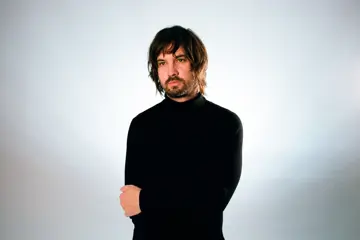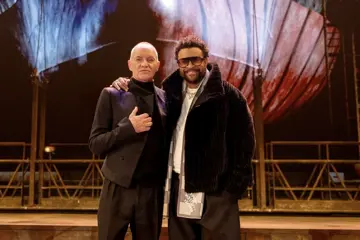 Manchester Orchestra
Manchester OrchestraKnown for building a rock dynamic that moves between intricate melodies and raw assaults on the senses by way of often tender, story-driven plots, Atlanta outfit Manchester Orchestra are back with an absolute beast of a record. Andy Hull explains the creative process which began with the band building a studio with their bare hands.
“Yeah, that is literally what we did,” chuckles Hull in a way that shows he's still aware of how crazy an idea it was. “We have a friend that had done a few home studios and he's a kind of carpenter guy by trade and a couple of the guys in the band – not me – are very good with that stuff. I'd come by every day, bring everybody lunch and tell everybody they're doin' a great job…”
It was a bold and ambitious way of asserting their newly independent status, and though it took cost pressures off the band, the album itself didn't flow as quickly as expected.
“I really was just looking at the Simple Math cycle and we were all pretty tired after touring for so long and it was really just kind of like, in order to be productive and start putting one foot in front of the other foot, what do we have to do? We have to find a place to record our stuff. We'd always had a studio but this place is like $1,700 a month and we could buy this house and pay $1,200 a month so it just made sense – and we all used to live in this house and the skies opened up and told us this is what you should do… I think we all thought it would come pretty naturally but it didn't; we were writing a lot of B-minus, B-plus songs, C-plus, C-minus songs. I think it allowed us the time; I think not having a label also allowed us the time to make sure that what we released was exactly what we wanted it to be...” Hull admits.
It wasn't until the band came up with the album's dirty, riff-heavy title track that they realised what Cope was going to be.
"It's not supposed to sound like everything else that you listen to; it's supposed to challenge you."
“We were just striking out, and other baseball references… and we just didn't have anything. And I wrote these lyrics that really hit me, and it's funny 'cause now I go back to listen to some of the lyrics that were on some of those earlier songs and they're so fitting and wonderful but I couldn't see it at the time, and that was the first time I was like, 'Oh wow, we're like really divin' into something here.' And then it all kind of made sense and it gave me that second wind – it's like, 'Alright don't worry, you'll figure something out.' The song was just so big-sounding, and that kind of set the table, it's like, 'Man if we just make somethin' that sounds insane – let's create something that's undeniable – and that song's sort of undeniable...”
Don't miss a beat with our FREE daily newsletter
On first listen, Cope is a flat-out wall-of-guitars record. The question of where Chris Freeman's keys have disappeared to is one that Hull suggests is paramount to the switch in dynamic.
“He's in there, it just all sounds like a guitar. He wrote all of his parts through a guitar amp so all of the stuff that you hear that sounds like another guitar is actually him – we just found that that was really blending well with the sounds. I think people think keys need to sound modern or whatever but we just put it through this big Fender amp and cranked it and on a couple of songs it's the lead line but just sounds like guitar… I think we just all were dedicated to the sound, from drums to bass and all of it; we really wanted it to be just slammed. And I think it sounds like a guitar record to people because the guitars are louder than what they're used to hearing. I've read a few people going, 'I don't understand the mix' – it's not supposed to sound like everything else that you listen to; it's supposed to challenge you.”
By introducing the new 38-minute long-player with Top Notch, a physically brutal lead single with an equally as terrifying parable-esque plot that has instantly captured a response at radio, Hull wanted everyone to understand that the band was back in force.
“We've always been limited in that sense when it came to releasing songs, so with [second record] Mean Everything To Nothing we would have loved to have released a song like Pride first, or something that's just kind of nuts – and this was the first time that we had a label that was like, 'Yeah.' What we wanted to do was like, 'Hey we're back after three years, and we're kicking your door down.'”















